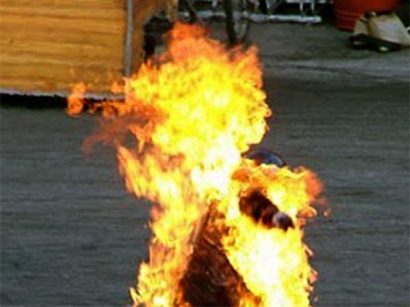
Green Movement Protestors
The Green Movement
The Iranian Green Movement (also known as the Persian Awakening or Persian Spring by the western media) refers to the movement that arose after the 2009 Iranian presidential election. Protestors wanted Mahmoud Ahmadinejad to be removed from office, and supported Mir Hossein Mousavi. Post election, the color green symbolized unity and hope for Mousavi’s politics, as people regarded the election fraudulent. Throughout Refuge: A Novel, the Green Movement is a point of contention. It forces Bahman’s arrest and unrest has unsettled Iran, and people are protesting in the streets.
In the article “The Iranian Green Movement: Fragmented Collective Action and Fragile Collective Identity,” the author, Arash Reisinezhad, argues that social movements are fluid, and that the Green Movement arose at a time when public space was heavily regulated by the Islamic Republic (IR). Because the IR regulated social networks, largely among students, Reisinezhad explains how many turned to activism namely in the form of the Green Movement and largely over virtual space. Reisinezhad details the importance of social media as a driver of the movement’s identity: Facebook became a new means of “face to face” communication that limited governmental interference and allowed the movement to cover vast territories, allowing the the Green Movement to amplify protests at a time when TV and print media were regulated.
Read the full story here.

A public demonstration of self-immolation
Self Immolation
Self immolation is a ritualistic and political suicide method. In Refuge: A Novel, the character Mam’mad performs self immolation as a means for escape because he keeps getting his plea for asylum denied by the Dutch government. Self-immolation is a complex phenomenon with multiple causes.
Womersley and Kloetzer’s article offers a psychological profile of a refugee, Armin, that chose self-immolation as a means of social recognition. It considers how, for many refugees, systemic trauma related to loss, displacement, and exposure to violence both before fleeing their home country and after, as both asylum seekers and refugees, affects their decisions and mental health. The authors argue that asylum seekers turn to self-harm when other forms of political activism do not allow them to reach their goals of public visibility and recognition. Its complex analysis of the refugee Armin details his personal story and his personal experiences can be extrapolated to many other refugees and asylum seekers who choose self-immolation, which the authors describe as a “communicative act resultant of trauma.”
Read the full story here.

Poppy pods, which produce opium
Opium Use in Iran
Since becoming the Islamic Republic of Iran, there have been changes in Iranian politics and policy that have sparked national intellectual and religious movements that affect Iranian relationships with illegal activities and illicit drugs, namely causing their use to increase. This article argues that the opium epidemic in Iran is caused by a chain reaction: the adopted policy maslahat (reasons of state) contradicts static traditional law and promotes dynamic law, thus, it causes changes in Islamic policy, ideology and/or development, which in turn affects opium use. The author details the legality of opium in Iran as well as Iranian responses to its legal status. Further in the article, the author, Lillian Figg-Franzoi, discusses the history of opiate use in Iran, from the socioeconomic class of its users, to its medicinal and recreational uses, to legal ramifications and criminal persecution. The article also outlines the current health issues that opium has caused in Iran as well as how Iran is trying to lessen the epidemic by treating addicts as victims and giving them medical help.
Read the full story here.
Geert Wilders

Politician Geert Wilders
Geert Wilders is a Dutch politician who has been the leader of the Party for Freedom (PVV) since he founded it in 2006. However, Wilders has been involved in politics since the 1990s. Author Koen Vossen attempts to give a broad overview of Wilders’s ideological development since 1990. Vossen argues that it is hard to classify Wilders as one type of politician, and thus focuses on his shift from a conservative liberal to an American-inspired neoconservatist, to his unique populist radical right politics, emphasizing the protection of Western liberal values against Islam. Vossen suggests during Wilders conservative liberal phase from 1963-2002, he was a professional politician working in the Dutch House of Parliament when his politics were skewed by Frits Bolkestein, a more confrontational politician with a more offensive conservative liberal ideology. During his neoconservative phase from 2002 to 2006, Wilders became an independent Member of Parliament and started to form a new right-wing party as a result of his still evolving political views. During his national populist phase from 2006 to 2011, he became increasingly Islamophobic, harsher and brusquer in his words and actions, and Islam became the “main enemy” in his eyes. Geert Wilders is a point of both conversation and contention at many points in Nayeri’s novel.
Read the full story here.

An Iranian couple holding hands
Iranian Divorce Court
Iranian divorce and marriage and both of their rules are prominent throughout Refuge: A Novel. In the Islamic constitution, Article four effects divorce law. In order for marriages to be viable for divorce, they first must be recognized in order to be allowed to enter court and negotiated. Mir-Hosseini provides the Iranian Civil Code which states, “a husband may divorce his wife at any time he wishes,” giving insight into the male hierarchy in Iranian culture. Mir-Hosseini gives a factual history of Islamic divorce court culturally and legally. He offers important distinctions about divorce law in pre- and post-revolutionary Iran and the importance of the Qur’an in legal decision making in divorce court.
Read the full story here.
Back to Refuge: A Novel Homepage
Sydney Gualtieri ’19


